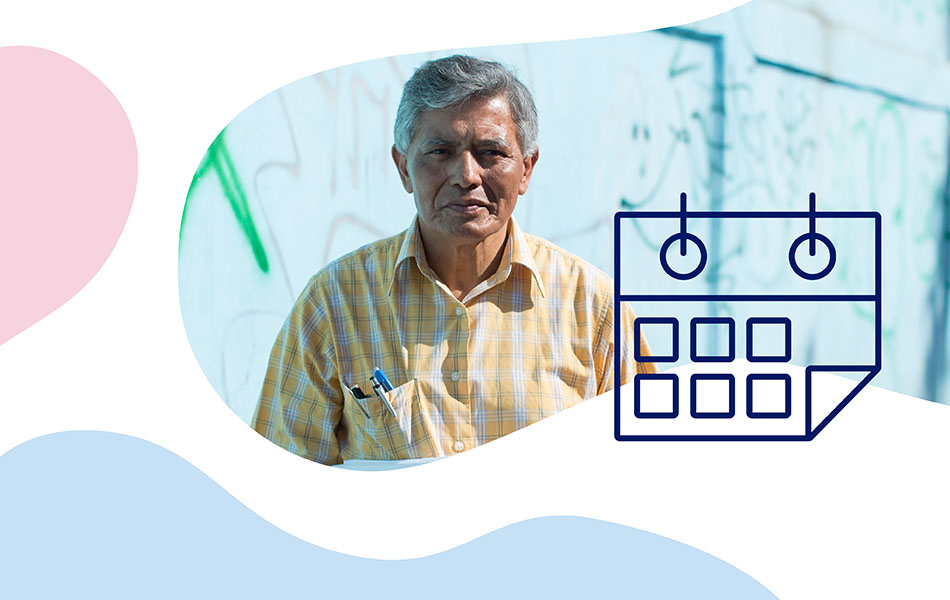
5 tips to reduce stress with type 2 diabetes
Many people with type 2 diabetes live long, active and fulfilling lives. But life with diabetes can also be stressful.
Being diagnosed with type 2 diabetes can feel like a setback at first. But identifying the problem brings you closer to the solution. Knowing what you’re up against means you can make a plan to get your health back under control and set a course to help manage your diabetes.
Here are some tips to help you get started.

This should always be your first step. Doctors and specialists can assess your state of health, recommend optimal treatment, and provide professional advice on your next steps.
When you first get diagnosed with type 2 diabetes, you may not be prescribed medication immediately.Depending on your state of health, your doctor may recommend that you start off by modifying lifestyle factors, namely diet and exercise.
If you are prescribed treatment, important to follow the guidance of your doctor. Some medications will come with side effects, however everyone's physiology and reaction to medications will vary.
Download our question guide here.
Nutrition is a crucial step, whether you’re already on medication or not. By planning your meals, and testing your blood sugar afterwards, you reduce the variables, making diabetes management a much simpler process.
High blood sugar can lead to damage of your blood vessels. Therefore, the more effectively you can balance your blood sugar levels, the less stress you put on your body, thus improving your long-term health.
For some people, it may be possible to manage type 2 diabetes through lifestyle factors alone. If nutrition is managed effectively early on, sometimes it can take years before medicinal intervention is required.
Your doctor may be able to put you in touch with a qualified nutritionist. While you’re at it, why not check out the Novo Nordisk Cookbook? It’s full of healthy recipes and free to download.
Learn more about how to eat to better manage your diabetes.
By keeping track of what you eat, as well as your blood sugar readings, it becomes much easier to review your progress each time you visit the doctor. It can also be empowering to increase your accountability and get a clear idea of how certain foods are impacting your health goals.
It may seem like a chore at first to keep a record of these details, but will soon become automatic to jot down a few quick notes at meal time.
The key to staying motivated with any plan – whether it be fitness, a new diet, or even learning a new language – is to set achievable goals and maintain a sense of progress.
Reward yourself for the wins and be determined to bounce back from your setbacks. It won’t always go smoothly – diabetes is a progressive disease so it will keep throwing new challenges at you from time to time.
If you’re meeting your goals in the areas you can control, you know you’re doing everything you can. If your body isn’t responding to these methods, it may be time to change the approach. Your doctor will be able to recommend the best path forward.
New habits can take a while to establish, but they become easier over time. When you first start actively managing your diabetes, it’s likely to feel like an adjustment and it’s possible you’ll forget a few things along the way. That’s okay. The key is to keep going. Even if you don’t see immediately results, trust in the plans put in place by your doctors and don’t punish yourself for minor setbacks.
It’s one thing to be able to control the variables in your day-to-day life at home or at work. But life is full of adventures, not to mention obligatory events that disrupt your usual day-to-day routine. Things like dining out, parties, transit delays, and holidays can all pose new challenges to how you manage your diabetes.
It’s a good idea to carry a small pack of emergency snacks wherever you go, as well as any prescribed medication and a means of testing your blood sugar throughout the day.
Managing your health can feel overwhelming at times, so it helps to have people around you who can lighten the load. If family and friends can help you with meal preparation, driving you to the doctor, or simply carrying extra snacks in the event of a hypo (low blood sugar), every little bit of support helps you stay healthy and in control of managing your diabetes for years to come.
Of course, you should also keep professional help close at hand. Stay in regular contact with your doctor, nutritionist, and diabetes nurse.
Speak to your doctor to get a type 2 diabetes management plan that works for you. Not sure where to start? Download our doctor question guide.
This is general disease awareness and should not be understood as medical advice. If you have any questions or concerns, you should contact your healthcare professional.